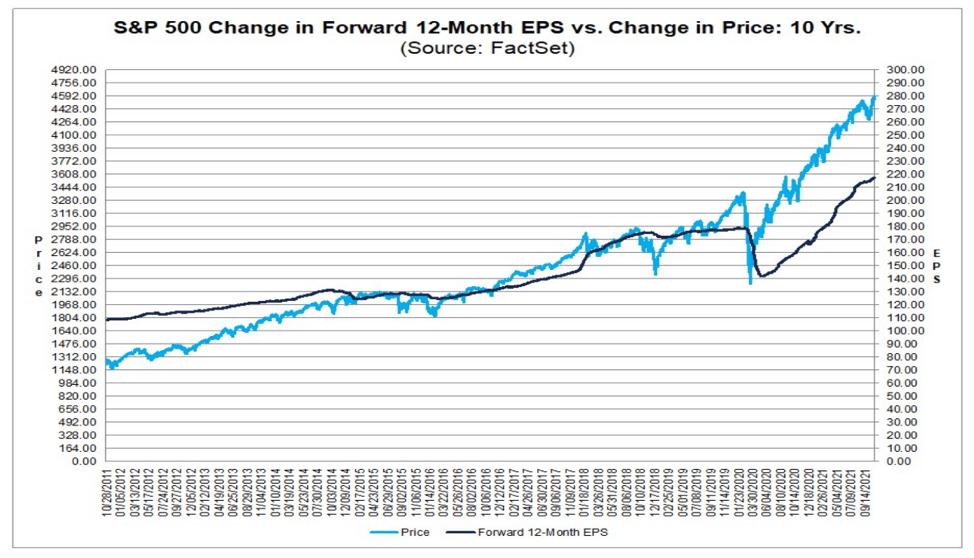Market Update: November 5, 2021
by Jason Gunkel CFP® CFA CAP® Chief Investment Officer | November 5, 2021
 Halloween is not the only scary thing that has occurred in the month of October. It has a bad reputation in the world of investing because October is when some of the largest market crashes have occurred, including “Black Tuesday” in 1929 and “Black Thursday” in 1987. However, this October proved to be more of a treat than a trick for investors.
Halloween is not the only scary thing that has occurred in the month of October. It has a bad reputation in the world of investing because October is when some of the largest market crashes have occurred, including “Black Tuesday” in 1929 and “Black Thursday” in 1987. However, this October proved to be more of a treat than a trick for investors.
The stock market, as represented by the S&P 500 Index, gained 7% in October as strong company earnings reports helped calm investors’ nerves and once again reached new all-time highs.
The stock market had its worst month of the year in September as rising inflation and slowing economic growth worried investors and caused the market to drop nearly 5%. Meanwhile, the bond market, as represented by the Bloomberg Barclays US Aggregate Bond Index, was flat for the month of October.
A little over half of companies in the S&P 500 Index have reported earnings results for the third quarter, and 82% of them have reported earnings that have beaten analyst expectations. The year-over-year earnings growth rate has been nearly 37%, which is the third highest rate since 2010. This is all according to information from FactSet.
The earnings results were headlined by Microsoft and Alphabet (parent company of Google) whose stock prices rose more than 17% and 11% respectively after reporting earnings above expectations. Tesla also reached a milestone with its stock value surpassing $1 trillion for the first time, joining the elite group of Apple, Amazon, Facebook, and Google all with values over the trillion-dollar mark.
The graph below shows that company earnings growth and stock prices move in close step with one another. Company earnings have rebounded to new highs since taking a big drop during the depths of the pandemic which have also driven stock prices to new highs.

Overall economic growth in the third quarter was not as impressive and it disappointed relative to expectations. The U.S. economy grew at a 2% annual rate in the third quarter when some estimates were as high as 7% at the start of the quarter, according to the Bureau of Economic Analysis. However, investors did not seem too bothered by the news and likely blamed a lack of supply of goods rather than a lack of demand from consumers for the lower growth rate.
In fact, the U.S. trade deficit (the amount by which imports exceed the value of exports) widened in September to a record high (nearly $81 billion), according to the . Demand for raw materials and goods for American factories and retailers has skyrocketed since the pandemic and to prepare for the upcoming holiday shopping season.
As a sign that the Federal Reserve is still optimistic on the economic recovery, on November 3 they announced plans to phase out one of its stimulus programs from the pandemic. The Fed has been buying billions worth of Treasury and mortgage bonds every month to hold down longer-term interest rates and stimulate the economy. Their holdings of these securities more than doubled since March 2020 and now the Fed plans to taper these purchases by $15 billion per month which would end the program by next June.
The Federal Reserve also stated that ending the bond-buying program would put them in a better position to raise interest rates next year if inflation continues to linger. However, they reiterated their confidence that while higher inflation will likely persist well into next year, it will not remain high in the long-term, according to Fed Chair Jerome Powell as reported by the . To hear more about our thoughts on inflation, be sure to attend our upcoming event, “Rising Inflation: What it Means for You and Your Investments" at 3:00 PM CST on Tuesday, November 16. Click here to register.
Investors may still be spooked by inflation but company earnings have been scary good and continue to push the stock market to record levels. Our investment team remains optimistic that strong earnings and economic growth backed by high consumer demand should continue to support higher stock prices.



